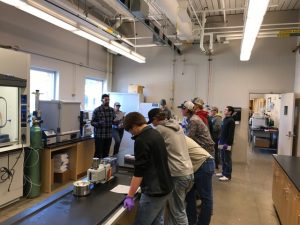by Paul Edlund
Six months in, and 600 tons of trash later, we are making progress on a variety of projects at St. Patrick Hospital and the University of Montana in Missoula. These places present unique challenges, but what these institutions share in common is their respective level of importance to the Missoula community and an internal community committed to improving the environmental impact of their institution. In addition, they make a fine place to learn tips and tricks for waste management.
As an Energy Corps member, I split my time serving between the University of Montana and St. Patrick Hospital. At both locations, I work directly with the resident sustainability coordinator. Our mission, being both broad and simple, is to change the management systems of each institution to have a positive impact on the environment and negate negative environmental impacts. Of course, the application of this principle is anything but simple.
If there is anything I have learned from these short six months, it has been that this line of work can take you in any direction and through a variety of work styles. Some mornings, I have found myself rifling through trash receptacles at 5 am and experiencing more than insignificant snowfall. Following one of these mornings, I found myself participating in meetings shared between the executive directors of one of the most distinguished hospitals in Western Montana. Thankfully, I found time to shower in between events.
What I find most inspiring about this line of professional work are the opportunities unfolding right here and right now. Sustainability practice is not a career path so well established as medicine or higher education; sustainability wasn’t even a fully developed concept until the United Nations wrote The Bruntland Report in 1987. This puts young people, and established professionals, in an opportunistic position.
After working with my supervisors, their colleagues, and coworkers, I have begun to recognize a common thread shared between them and their work. Many, if not all, did not begin their career path being focused on improving environmental impacts or the concepts of sustainability. Historically, education systems did not include content about the Tragedy of Commons or consider climate change to be a factual phenomenon.
But what I have seen now, through these executive meetings and a conference for Sustainability in Higher Education in San Antonio, is established institutions across the country are developing new management systems. These systems are becoming more and more conscientious of their environmental impact. What I think is even more exciting is these concepts are becoming normalized for the new generation entering the workforce. These are the people who will inherit that which is already established, or build their own enterprise.
_________________________________________________________________________________________
 Paul Edlund holds a bachelor’s degree in Environmental Studies with a minor in Climate Change Studies and a certificate in Sustainable Business from the University of Montana. Prior to Energy Corps, Paul assisted in the development the 2017 STARS (Sustainability Tracking And Rating System) report with the UM Sustainability Department. Paul joined Energy Corps in October 2017 and will serve in the City of Missoula at the University of Montana and St. Patrick’s Hospital as a Sustainability Educator. He will develop sustainability reports to describe the sustainability of the two institutions and implement strategies to improve the quality of sustainability.
Paul Edlund holds a bachelor’s degree in Environmental Studies with a minor in Climate Change Studies and a certificate in Sustainable Business from the University of Montana. Prior to Energy Corps, Paul assisted in the development the 2017 STARS (Sustainability Tracking And Rating System) report with the UM Sustainability Department. Paul joined Energy Corps in October 2017 and will serve in the City of Missoula at the University of Montana and St. Patrick’s Hospital as a Sustainability Educator. He will develop sustainability reports to describe the sustainability of the two institutions and implement strategies to improve the quality of sustainability.








